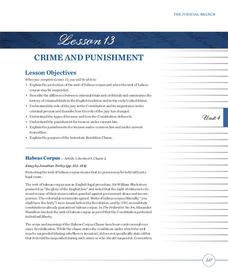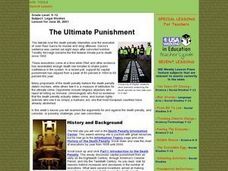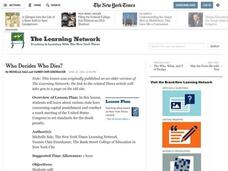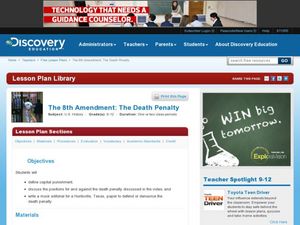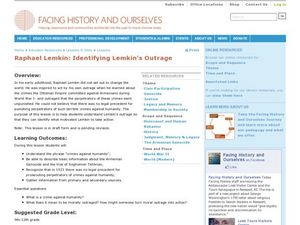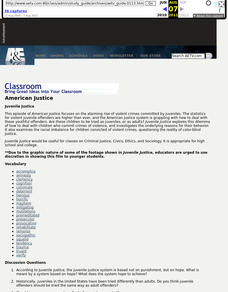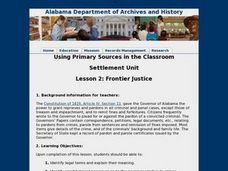Heritage Foundation
Crime and Punishment
You wouldn't give someone a 10-day timeout for eating a piece of candy. The US government, too, does not believe in unreasonable punishment. A variety of exercises exploring the clauses of the US Constitution prompts class members to...
Curated OER
The Ultimate Punishment
Students discover information about the death penalty debate. They explore the history of the death penalty and how it has changed over time. They examine supporting and opposing viewpoints of the issue.
Curated OER
Who Decides Who Dies?
Students explore various state laws concerning capital punishment and conduct a mock meeting of the United States Congress to set standards for the death penalty.
Curated OER
The 8th Amendment: The Death Penalty
Students take a closer look at the death penalty. For this U.S. government lesson, students watch a Discovery video about capital punishment in the United States and then compose letters to the editors of newspapers about their stance on...
Curated OER
Do We Need a Permanenet International Criminal Court?: War Crimes, Violence, International Law and Politics, Nuremberg
In this lesson, students explore the history, relevance and current application of international tribunals for war crimes. Students look at cases from the Nuremberg trials, Tokyo trials and the Bosnian War.
Facing History and Ourselves
Justice After the Holocaust
Though there could be no true justice for the horrors of the Holocaust, many of those responsible for crimes against humanity were found guilty in the eyes of the law. Using primary and secondary sources in the 16th installment of a...
Facing History and Ourselves
Raphael Lemkin: Identifying Lemkin's Outrage
Students examine World War I war crimes. For this world history lesson plan, students use primary and secondary sources to research Armenian genocide and the trial of Soghomon Tehlirin.
Curated OER
Blasphemy! Salman Rushdie and Freedom of Expression
Students explore the concepts of blasphemy, censorship and freedom of expression through the lens of Salman Rushdie. They also consider how these issues have been reflected in US history.
Curated OER
the International Criminal Court's History And Uses
Students analyze and come to explain the history behind the formation of the International Criminal Court, along with the recent controversy facing the Court; and current crises that warrant the Court's attention.
Facing History and Ourselves
What is Justice After Genocide?
High schoolers explore the meaning and implications of genocide. In this human rights lesson, students investigate the Aremenian genocide that took place in Turkey and the subsequent trials of the leader of the...
Facing History and Ourselves
Continuing Lemkin's Legacy: What Can We Do to Prevent and Stop Genocide?
Young scholars investigate genocide. In this contemporary history lesson, high schoolers research Darfur advocacy organizations and present plans of action to stop the injustice in Darfur.
Curated OER
American Justice: Juvenile Justice
Students watch a video that focuses on the alarming rise of violent crimes committed by juveniles. They see how the American justice system dealsl with these youthful offenders. They examine racial imbalance and color-blind justice.
Curated OER
Frontier Justice
Students make an investigation into the Constitution of 1819, Article IV, Section II, gave the Governor of Alabama the power to grant reprieves and pardons in all criminal and penal cases, except those of treason and impeachment, and to...
University of Pennsylvania
Using Comic Strips to Teach Multiple Perspectives
Scholars view comics from two different perspectives; one paints the Alfred Dreyfus as innocent, while the other portrays the exact opposite. They solve the mystery of what happened by analyzing the source, working in groups, and...
Curated OER
Essentials of the US Constitution
Students determine how the content of the U.S. Government enables the U.S. Government to function. They examine the roles and functions of the three branches of government and how the separation of powers and checks and balances affect...
Curated OER
Fort San Cristobal
Students research the concept of a dungeon during the time of the 18th century. They are looking for its significance and the reason for its construction tied to the lifestyles of people during the time. Students compare and contrast the...
Curated OER
Transcription of the Virginia Declaration
In this teaching primary resources worksheet, students read a transcription of the Virgina Declaration . Students read the excerpt and discuss its significance.
Curated OER
Darfur Now Lesson Two: Responding to the Violence in Darfur
Students explore the concept of political activism. In this Darfur conflict lesson, students watch "Darfur Now" and consider the stories of the political activists featured. Students use the information regarding the activists to create...
Curated OER
Murder in Ha-Tien: The Concept of Justice in Chinese Society
Eleventh graders become aware of alternative perceptions of reality. They analyze the concept of justice by showing it in an unfamiliar socio- cultural context, inviting comparison. They practice reading comprehension.


